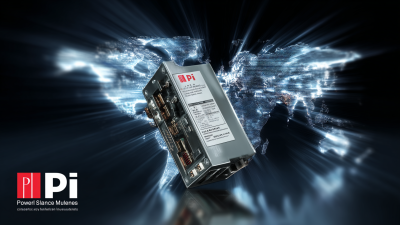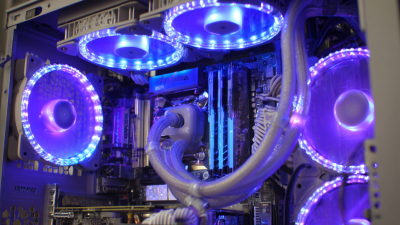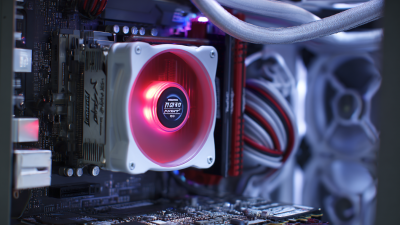Leave Your Message
- Phone
- E-mail
- Whatsapp


Choosing the right power supply manufacturer is a critical decision for any business involved in the electronics or energy sectors. The effectiveness and reliability of your power supply can significantly impact the performance of your products and the satisfaction of your customers. With a myriad of options available in the market, it's essential to consider various factors that differentiate these manufacturers, from their technological expertise to their ability to provide tailored solutions that meet specific business needs. This blog will explore the alternatives in power supply manufacturers, helping you navigate through the complexities of selecting a reliable partner that aligns with your operational goals and ensures the seamless integration of power solutions into your projects. By understanding the key attributes and offerings of different manufacturers, you can make an informed choice that supports both your immediate requirements and long-term business success.

When selecting a power supply for your business, understanding the specifications is crucial to ensure optimal performance and reliability. Key metrics to consider include output voltage, current rating, efficiency, and form factor. According to a report by Mordor Intelligence, the global power supply market is projected to grow at a CAGR of 6.5% from 2022 to 2027, revealing the increasing importance of high-quality power solutions. Pay close attention to these specifications to match your equipment’s needs and avoid potential downtimes.
**Tip:** Always look for power supplies with a high efficiency rating (above 80%) as it reduces energy waste and can significantly lower operational costs over time. Many leading manufacturers now provide energy-efficient models that meet international standards.
Moreover, consider the load regulation and ripple voltage when assessing power supply options. These parameters indicate how stable and reliable the output will be under varying loads. A well-regulated power supply reduces the risk of device failure and enhances overall system longevity. A report by Grand View Research highlights that improper power supply can lead to up to 30% equipment failure, emphasizing the need to prioritize these specifications in your selection process.
**Tip:** Consult with manufacturers about their testing and validation processes to ensure the reliability and durability of their power supplies before making a decision.

When selecting a power supply manufacturer, evaluating their experience and industry reputation is crucial for ensuring reliability and quality. Manufacturers with extensive industry experience often demonstrate a deep understanding of market demands and technological advancements. Look for companies that have been in business for several years, as their longevity usually indicates a solid track record of performance and customer satisfaction.
Additionally, experienced manufacturers are more likely to have developed robust quality control measures, ensuring that their power supplies meet safety standards and regulatory requirements.
Industry reputation also plays a significant role in choosing a manufacturer. Researching online reviews, customer testimonials, and case studies can provide insight into a company's reliability and the satisfaction of its clients. Engaging with industry forums and professional networks can uncover valuable feedback from peers who have experience with specific manufacturers.
Choosing a manufacturer with a strong reputation not only reflects their commitment to quality but can also enhance your business's credibility. A reliable power supply partner can significantly impact your operations and long-term success.
When selecting a power supply manufacturer, it is crucial to prioritize compliance with international safety standards and certifications. These certifications, such as ISO, IEC, and UL, not only signify that the manufacturer adheres to rigorous safety protocols but also indicate a commitment to delivering high-quality products. A manufacturer that possesses these credentials demonstrates reliability and integrity, essential traits for any business looking to forge a long-term partnership.
Moreover, compliance with safety standards plays a significant role in mitigating risks associated with power supply failures. By ensuring that your manufacturer meets these criteria, you are safeguarding your operations from potential hazards, legal liabilities, and financial losses. In addition, many industries, such as medical and aerospace, impose strict regulatory requirements, making it imperative to choose a manufacturer that can not only meet but exceed these standards. Evaluating a manufacturer's safety track record and customer reviews can further bolster your confidence in their ability to provide reliable and safe power solutions for your business.
| Manufacturer | Maximum Output Power | Efficiency Rating | Certifications | Lead Time | Customer Support |
|---|---|---|---|---|---|
| Manufacturer A | 500W | 90% | UL, CE, ISO 9001 | 3-4 Weeks | 24/7 Support |
| Manufacturer B | 750W | 88% | ETL, CE | 2-3 Weeks | Business Hours Support |
| Manufacturer C | 1000W | 92% | TÜV, ISO 14001 | 4-6 Weeks | Email Support |
| Manufacturer D | 300W | 85% | FCC, CE | 1-2 Weeks | Phone Support |
When selecting the right power supply manufacturer for your business needs, analyzing supply chain reliability and component sourcing strategies is paramount. Recent developments indicate that trade disruptions and economic volatility are significantly challenging procurement strategies. Companies are diversifying their parts sourcing and utilizing digital tools to enhance resilience against such disruptions. Research shows that companies employing strategic sourcing approaches that emphasize vendor relationships and overall value rather than just cost are better positioned to navigate these challenges effectively.
**Tip 1:** Consider leveraging alternative sourcing solutions to improve agility and cost efficiency. As industries face evolving demands, flexible sourcing strategies become critical for maintaining a competitive edge. A report highlights that successful companies are integrating digital tools to streamline supplier selection and inventory control, ultimately optimizing their supply chain management.
Long-term planning in component sourcing is essential for high-reliability markets. Industry data suggests that original equipment manufacturers (OEMs) that focus on data-driven sourcing strategies can better mitigate risks associated with future supply constraints. By adopting advanced analytics and machine learning techniques, businesses can enhance their decision-making processes, resulting in improved procurement outcomes.
**Tip 2:** Embrace innovative sourcing approaches that prioritize sustainability and align with market trends. As the demand for battery-related raw materials surges, aligning your sourcing strategy with environmental considerations can also offer a competitive advantage in the long run.

When selecting a power supply manufacturer, it's essential to compare not only the cost-effectiveness but also the warranty options offered. According to a recent report by IC Insights, power supply units account for approximately 6% of the total semiconductor market, highlighting the importance of investing wisely in reliable manufacturers. A cost-effective unit is not just about the initial purchase price; it also encompasses efficiency over its lifecycle. For instance, power supplies with higher efficiency ratings can significantly reduce operational costs, with the Department of Energy estimating potential savings of up to 30% on energy bills.
In addition to evaluating costs, warranty options can provide critical insight into a manufacturer's reliability. A comprehensive study by Statista found that 68% of businesses consider warranty length as a significant factor when selecting equipment suppliers. Manufacturers offering extended warranties or comprehensive service packages often indicate higher confidence in their product quality and longevity. Analyzing warranty terms not only helps prevent unforeseen expenses but also establishes trust in the manufacturer, as a robust warranty reflects their commitment to customer satisfaction and product reliability.






